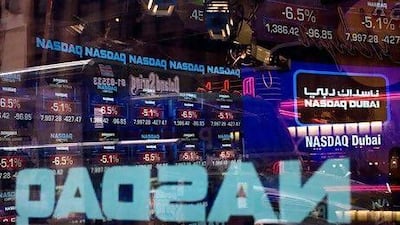The UAE has emerged as the leading financial centre in the GCC region in a survey conducted by The National with the Middle East Investor Relations Society (Meirs).
The financial hubs in Abu Dhabi and Dubai scored 35.5 out of a possible 50 points based on five key criteria used by Meirs to evaluate shareholders' standing in the six GCC countries.
Saudi Arabia came second in the ratings, with a score of 34 points, narrowly ahead of Qatar on 32.5.
The five key Meirs criteria are: the regulators; jurisdictional issues in the country concerned; the stock exchanges; the capabilities of investor-relations departments; and the level of international investor interest in each market. The assessments were made by The National over a six-week period.
The survey found "the UAE's sophisticated regulatory environment, highly developed financial infrastructure [especially in the Dubai International Financial Centre] and a commercial legal system increasingly following rules of 'international best practice' are all viewed as the best in the region" by financial professionals.
"This survey confirms the UAE's lead over rival financial centres in the region," said Oliver Shutzmann, the chief communications officer at the UAE investment bank Shuaa Capital. "This follows the combined effort of regulators, exchanges and listed companies to remain attractive to the global investment community."
However, the number of stock exchanges in the Emirates and relative lack of trading liquidity were regarded as negative factors for the UAE and potential brakes on future development.
In Saudi Arabia, by far the biggest and most liquid equity market in the GCC, the survey found its ambitions to be the top regional financial hub were hindered by the ban on direct ownership of Tadawul (Saudi stock exchange) shares.
"Progress has indeed been slow since the last move towards opening up the Tadawul in 2008, when foreigners were allowed access via 'total return swaps' arrangements with local firms but many institutional investors remain wary of these instruments," the survey found.
"Saudi Arabia has the potential to be the unrivalled financial centre of the GCC but there is still work to be done to get there," it concluded.
Paul Reynolds, a Rothschild banker who is also the chairman of Meirs, said the order of countries on the list could change over time. "All countries are making good progress in investor relations and I wouldn't be surprised to see the rankings change year to year.
"As for the analysis itself, we hope it becomes even more objective over time and includes Singapore and London, for example, as real benchmarks," he said.
On third-placed Qatar, the survey found, "The outwardly sleepy exchange is home to some of the region's largest industrial, financial and property giants such as Industries Qatar, the petrochemicals maker, and Qatar National Bank, the country's largest lender. Their collective shares are worth more than US$125 billion [Dh459.13bn]."
Again, Qatar's limits on foreign share ownership are seen as a drag on the country's ambitions.
Oman won plaudits for recent moves to improve the investor-relations culture.
The protests in Bahrain affected its ranking, especially its attractiveness to foreign investors.
On Kuwait, the survey found it had "some way to go to meet international standards of investor best-practice, with much of the financial infrastructure of the country characterised as work in progress after years of policy inertia and inconsistency."

